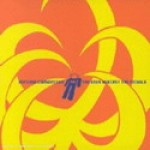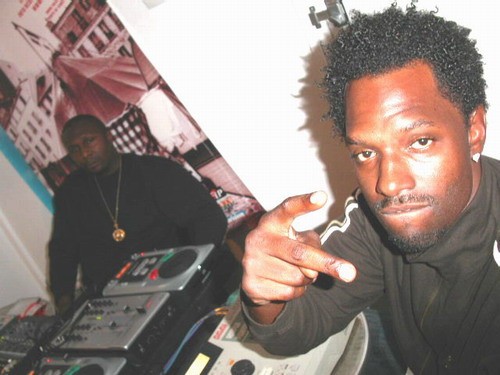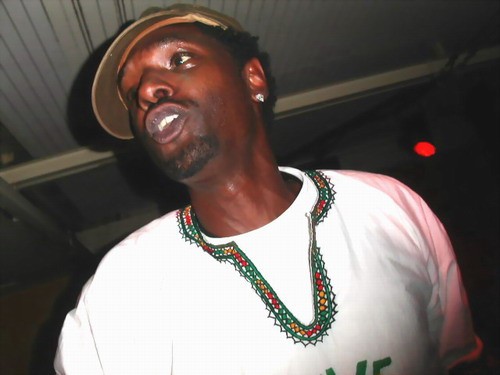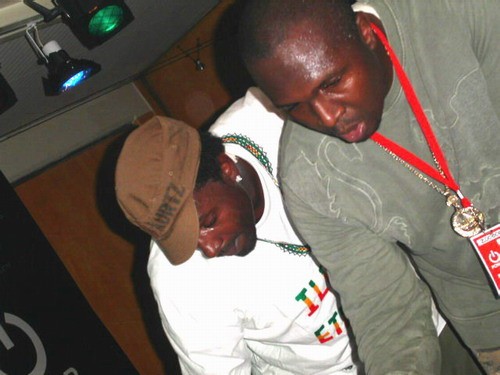Airborn Audio (Part 2)
Location: Villette Numérique, Cité des Sciences, Paris, France.

Hip-Hop Core: Let's go back in time. Sayyid, how did you hook up with Beans and Priest?
M. Sayyid: I hooked up with cats in an open-mic situation and we decided to do some joints. We just linked up together and formed a consortium. We put out tapes first and we dropped an album, then another album. And from that, we took the consortium to the next level by switching up and going into Airborn. We spent a little bit of time in the lab, in the shed, just working on what we need to work on as far as being producers and writers. We finished that. We have the new album called "Good Fortune" dropping in February. You'll see the growth and development.
HHC: Priest, could you tell us a few words about your time with the Boom Poetic Collective and about the "Flippin The Script" album? What was your mentality at the time?
High Priest: That was a project led by Shä-Key mostly and she's still doing hot joints that will hopefully gain a little bit more visibility as time goes. I owe a lot to her just by the fact that she had something going on and made me a part of, early on in the game. Through that exposure, we linked up with the Nuyorican poetry scene and that's when we did the "Flippin' The Script" album… That was a good time. Back then, I didn't produce. Over the last five years, holding down production is the difference between then and now.
HHC: What about your mentality at the time, Sayyid?
M: My mentality was "Spit"! Just sixteen bars, no hooks, just spittin'. Patterns, rhyming as fast as I could. As time went on, I thought "Ok, I don't have to rhyme as fast". I could just emphasise smaller parts of the rhyme and stay in the pocket to get that personality. When I first came out the gate, dog, you couldn't hold me down. I was just up in the air, rhyming fast. It was cool to be able to experience that and I'm glad I learned how to rhyme like that because I can throw little patterns in...
HP: People think that that style of rhyming is the "be all and end all" and everything. But when you can rhyme fast and still be dynamic and still have character… Which is a format that Sayyid in particular kinda put down early on for the whole game. Just because you're underground does not mean that you have to necessarily be out of the pocket. You could still respect the pocket, still respect song structure and people's ear by not bombarding them. You give'em a little bit and pull off.
M: A lot of the things we do is abstract but it's pure laziness to be totally abstract. And I gotta say is that cats need to knock it off and come with some shit that's clear so cats can understand them. Still be abstract but don't make a whole album with no good hooks and just abstract rhyming.
HP: There's a difference between "this doesn't make sense" and "this is abstract". We're abstract but some things just don't make sense. And I don't mind that sometimes because everything is possible. But if you're going to be lazy, then you have a problem.
M: The hardest thing in the world is making things very very clear. Way harder than making something unclear. The idea is to be clear and then sometimes be unclear. It's that vocal performance. As we think, our minds are thinking abstract terms, but not all the time. Sometimes. So it's that fine line.

HHC: Sayyid, I believe you were very close with the people over at Wordsound. Beans told us that you're at the origin of the release of "Diagonal Rhyme Garganchula" on Spectre's record label… Your side of the story?
M: It was actually jumped off with HP. HP put me on to Wordsound. He was involved in my very first release on anything. He was politicking with a lot of people and I would politic with Wordsound and dealt with Skitz and those guys over there. Wordsound was and still is a great label with great music. It was really typified by a certain era, like the end of the nineties… It was a great time and these cats really embraced me.
HP: I hooked up with Wordsound 'cause we had the Antipop Consortium and they had the Crooklyn Dub Consortium. So just because of those two names, we began talking about what we were doing and from there we hooked up. Skitz gave us the opportunity to release some things early on. The first thing was on a compilation he was doing called "Subterranean Hits". Those were dope. There was Prince Paul and Rob Swift on there, so being in that company was good for us, early on in our career. So for the readers of this site, we just wanna big up Wordsound.
HHC: Were you surprised by the critical acclaim received by "Tragic Epilogue"?
 HP: Not to be like an asshole style but not really in fact. Because we did leg work early on to help it be seen. It's cool to do a project and then when you put it out no one hears it but then it's just an exercise. If you put it out, you're a commercial artist, for sale. In recognizing that we're commercial artists, you have to do work for your joints to be heard. We all busted our asses to make sure that cats knew what was coming. Made sure that cats knew it was in stores, knew how much work we put into it. Considering where the game was compared to what our sound was at the time and to all the other things that were around us at the time, it was a big reach so we worked hard for that.
HP: Not to be like an asshole style but not really in fact. Because we did leg work early on to help it be seen. It's cool to do a project and then when you put it out no one hears it but then it's just an exercise. If you put it out, you're a commercial artist, for sale. In recognizing that we're commercial artists, you have to do work for your joints to be heard. We all busted our asses to make sure that cats knew what was coming. Made sure that cats knew it was in stores, knew how much work we put into it. Considering where the game was compared to what our sound was at the time and to all the other things that were around us at the time, it was a big reach so we worked hard for that.
HHC: What was your goal with "Tragic Epilogue"?
M: The goal was pretty much the same agenda that we are still in, which is pushing it, pushing ourselves, trying to work it out to get it where we want it to be. The one great thing about "Good Fortune", it's funny because "Good Fortune" is a lot like "Tragic Epilogue" was, in the time that it was released. Except that now we're 5-6 years later. It has a lot of the same spirit that "Tragic Epilogue" had. I'm excited for cats to hear it.
HHC: Beans told us that you didn't want to release "Shopping Carts Crashing" initially, why is that?
 HP: The whole thing with "Shopping Carts" was that it was supposed to be an EP at first. We got an offer to do something exclusively for Japan so we took the EP and turned it into an album. It wasn't conceived as an album so our motions around it at that time were different than if we just did another Antipop album. We didn't want to confuse people and to make them think that was our follow-up album. "Arrhythmia" was the follow-up album. Some people like "Shopping Cars" better than "Arrhythmia", it's apples and oranges but at that time, that was the logic of it.
HP: The whole thing with "Shopping Carts" was that it was supposed to be an EP at first. We got an offer to do something exclusively for Japan so we took the EP and turned it into an album. It wasn't conceived as an album so our motions around it at that time were different than if we just did another Antipop album. We didn't want to confuse people and to make them think that was our follow-up album. "Arrhythmia" was the follow-up album. Some people like "Shopping Cars" better than "Arrhythmia", it's apples and oranges but at that time, that was the logic of it.
HHC: A few years down the line, what do you think about the Isolationist and your work with DJ Vadim?
HP: Definitely big up to DJ Vadim.
M: Vadim was a cat who could make sample joints that were still far-reaching and sparse. He knows how to do that and that's hot. Not a lot of people can do that. He's nice with that. We just recorded the album in New York and shipped it to Vadim in London.

HHC: How was it working with DJ Krush?
HP: Honestly, I haven't met him yet. That was all done via e-mail but we appreciate him hollerin' at us.
HHC: Which Antipop album is your favourite and why?
HP: "Tragic" obviously. Just because it is the one that we had the most relationship with. From there, we moved on and did the other things that we've done but for me, at that early time, everything that was going and there's a lot of different memories connected to making it. Another reason why "Tragic" just comes back is because when we did Airborn we saw how much it was the same thing. We were doing production the same old way. So, yeah, "Tragic Epilogue".
HHC: What led you to release "The Ends Against The Middle" EP between your 2 official albums?
 HP: Just to set up the album.
HP: Just to set up the album.
M: To be honest, where we're at right now is where we've wanted to be. It's hard to explain but having the direct access of the studio, spending the time working on music and getting stuff right, getting our writing and our production up has combinated into a situation now where we just know what we have is crazy. And it is crazy. This is my favourite time ever making music. I'm finally as an artist reaping the fruits of my labour. We're trying to battle the best cats now. We're trying to battle Timbaland, Dre, Nottz, Alchemist… Humbly, but we just strive to what the best cats are doing. That's the same with lyrics too. We try to emulate them. For example, listen to this stuff (note: giving us some headphones to listen to some fantastic new tracks). It's definitely our best work!
HP: Just listen to the music. We've been having this conversation for a good minute now but these beats speak about it more than whatever we could say. The album "Good Fortune" is all rhyming.
HHC: Why did you decide to release the mixtape CD "Coming Soon" as a prelude to "Good Fortune"?
M: We threw that out there last year to show what we were doing. We had to do it. We didn't really run with it too heavy. Now that the album is done we can throw this new joint out there and really go hard. But there's no use in going hard if you don't have a release date. You have to have a destination. Now we can hit the footwork and get the promos where they need to go. A lot of cats think that people are just gonna pick it up off of the shelf just randomly, but people don't do that anymore. They wanna hear it first, they wanna see what's really hot, they wanna burn it from somebody so you have to give them a reason to buy it. That's why we're just going to spread ourselves as much as we possibly can. G-Unit style!

HHC: Last year, an Airborn Audio street mix was also floating around where you were rapping on the 'C.R.E.A.M.' instrumental among others. Where does this project come from?
M: Oh, yeah! Y'all got that!? That was the very first Airborn Audio mixtape.
HP: Before we started the album, we said: "let's do a mixtape to let everybody know we're still doing this after Antipop". We just gathered a couple of joints and put it out there. While we were working on the album, we figured it was gonna take a minute because it needed to be the right way so we released some other street projects just to build up steam.
HHC: When you were in Antipop, each member of the group worked in his own home studio, brought ideas to the table, discussed about them, etc. But don't you think that this particular functioning kinda doomed Antipop from the start since it necessarily must have been a source of frustrations?
HP: No. There wasn't any hostility around or anything like that. And that's how we still work now as Airborn. Sayyid was coming to my lab, I was going to his lab and the central link between us was Earl Blaize. With this album, that wasn't the case for so much of the work. We just linked in our own respective studios and held it down like that.
M: Was Antipop doomed? It's an interesting question. Would that lead to the dismemberment of Antipop? The thing about it is, we wouldn't have been APC without breaking up! That's what we would do! That makes perfect sense if you look at it because it just keeps it punk rock. But the whole thing about Antipop or Airborn is that type of situation where, if I feel like an artist is in the group and he's not doing what I think is his best, I mention that to that person. If HP says "Sayyid, I know you can do it better", I'll listen. That's how it's gotta be in a group. But you gotta keep moving. If you think that I'm gonna do something just to be mean, then you don't know me, that's not how I get done. So it's those things that kinda combinated and led to the end of Antipop.

HHC: Recently, while reading one of your old interviews, I saw Beans saying: "That's how most people break up in groups: by not realising that they are individuals. They just get so consumed in the group that they forget their own individuality"… Is that the way you broke up?
HP: No. Groups break up because individuals don't know how to respect the collective body. There's no conspiracy to destroy anybody's individuality because individuality's what makes the group. When you see Mick Jagger, he ain't trying to do the same things that Keith Richards is doing. And Charlie Watts is holding down his thing, knowing his position. Everybody plays their position in the group and that collective voice is what makes the Rolling Stones or Led Zeppelin or The Jimmi Hendrix Experience or Funkadelic. Even with Antipop, some people gravitated to each one of us differently but at the same time, there was a common thread that we all respected, which was: "keep your bars up".
M: Yeah, it's all about spit, all about lyrics. That's what we always stay about.
HHC: Sayyid, why didn't you want to work on the Blue Series album with Matthew Ship?
M: It was just something I was like "yeah, no". Priest had actually hooked the situation up and he asked Ballbeans and myself to get down. At the time, I just wasn't into doing it.
HHC: What can we expect from tonight's show?
M: We just gonna bang out, man. Just do what we do. There's gonna be a lot of songs that cats haven't heard before. We just gonna do the damn thing.
HP: Everybody who saw an Antipop show, it's the same because we're not trying to run from that.

HHC: What's behind the name Airborn Audio?
M: Just that's it. It is what it is. There's nothing deep about it. Airborn Audio is Airborn Audio. But that's funny, I thought about it and if you think about it air that's born becomes audio. So it makes perfect sense.
HHC: What can we expect from "Good Fortune"? How would you describe it?
M: The best way I could say it is that "Good Fortune" is the "Tragic Epilogue 2005". That's the easiest way for me to really to say it to people who haven't heard it yet. Better tracks, same kind of feeling… without the guest appearances.
HHC: Could you introduce Cx Kidtronik with whom you've worked on your recent projects?
M (calling Cx): Cx! There's very few people who I know who really get what we do. He's one of those people and it reflects in his beat selection, in his music, in his song selection and in how he operates as an artist. He's on some next shit and that's the right way. He keeps it ill but keeps it in the pocket.
HP: Cx is a cat who's also a hot DJ as well as a producer. He's in the same spirit…
Cx Kidtronik: Hi. I'm from ATL. My album "Crack Attack" will be released on March 2005 on Sound Ink Records. I got High Priest on 2 cuts, I got the beautiful Vinia Mojica on a cut, Rustee Jux from Boot Camp Click, Zion I, Deuce Gangsta, some kids off the block, it's crazy. I might have Fab Five Freddy to do "Change The Beat 2005" in French… but he says he ain't rapped in 20 years. I got Nat from Heat Sensor doing a lot of the editing and the mixing and putting it all together in an audible format.
HHC: Thanks, Cx. Airborn, do you have any other upcoming projects apart from "Good Fortune" ?
M: We got an horror flick jumping off. This dude named Derrick is producing the joint. It's gonna be dropping in May of 2005. We're acting in the whole film, it's 15 minutes long.
Interview by Cobalt
Photos by Nicolanifanta & MC23
February 2005